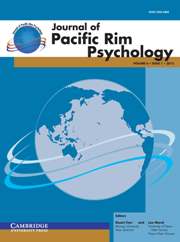No CrossRef data available.
Article contents
Discussion of Montiel and Belo: Nonviolent Democratic Transitions Within a Peace Psychology Framework
Published online by Cambridge University Press: 23 February 2012
Abstract
In addition to being the bloodiest century in human history, the 20th century was distinguished by many large-scale nonviolent movements that successfully toppled oppressive regimes, often in the face of overwhelming military power. Notable examples include: India, South Africa, Poland, Czechoslovakia, the Philippines, Chile, and Serbia (cf. Ackerman & DuVall, 2000; Ackerman & Kruegler, 1994; Zunes, Kurtz, & Asher, 1999). Montiel and Belo's research is unique, identifying human cognitions, emotions, and values that accompanied East Timor's nonviolent transition to democracy. The current article places their work within the larger framework of peace psychology
- Type
- Articles and Discussions
- Information
- Copyright
- Copyright © Cambridge University Press 2008




